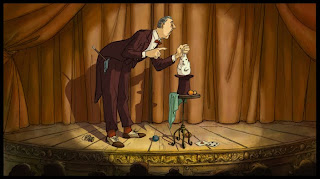 Films about magicians share a common thread; they’re usually about loners. In Sylvain Chomet’s “The Illusionist” we meet an aging magician working in cheap pubs and old theaters (whose simple act involves hats and rabbits while performing to a very small audience, sorry leftovers after a Rock and Roll show). To survive, he also takes jobs on clothing stores and garages, jobs which he detests.
Films about magicians share a common thread; they’re usually about loners. In Sylvain Chomet’s “The Illusionist” we meet an aging magician working in cheap pubs and old theaters (whose simple act involves hats and rabbits while performing to a very small audience, sorry leftovers after a Rock and Roll show). To survive, he also takes jobs on clothing stores and garages, jobs which he detests. “The Illusionist” brilliantly captures the everyday details of the city of Edinburgh (a rich city known for its gothic architecture that, kind of, smells of wet stone and seaweed the last time I visited it). The visual style of the movie is similar to Chomet’s “The Triplets of Belleville” but the tone is different, it goes for nostalgia instead of whimsy. I wanted to love this movie as much as I loved “The Triplets” but I missed the sense of joy of the earlier film. “The Illusionist” introduces a young woman who follows the magician around but we’re never sure about the nature of their relationship (although it could be deemed creepy considering their age differences, it’s never depicted in a sexual manner).
Chomet’s “The Illusionist” shouldn’t be confused with 2006’s “The Illusionist” starring Edward Norton, Jessica Biel and Paul Giamatti. That “Illusionist” was a traditional love story set early in the 20th century. I liked the movie as an innocuous adventure with romantic undertones. Even though every actor is playing a stereotype (none more obvious than Rufus Sewell as the evil prince), the acting makes the film believable and very entertaining (even Biel shines in a role that is not your typical damsel in distress). The movie is a throwback to the more story-driven Hollywood genre pictures of old.
Shortly after “The Illusionist” was released in theaters, Christopher Nolan released “The Prestige”, a very different magician’s tale. The movie is yet another Nolan mind-bender focusing on the rivalry and obsession of two competing performers. The story is set within the invention of electricity, introducing Nikola Tesla as the inventor of a strange machine that may have supernatural powers (a whole movie could be made depicting the rivalry of Tesla and Edison during this period).
“The Prestige” is the kind of film that rewards multiple viewings, as every one of Nolan’s movies. The obsession in the story takes it to self-destructive consequences (in more than one sense) and the film clearly shows the risks of performing live stunts (we have to remember that Harry Houdini died in a fatal accident while performing). “The Prestige” is a richer experience than “The Illusionist” but it appeals to a different audience altogether (one more interested in dark and cerebral parables).
I’ve always liked magic. My father used to impress me with the most simple and banal tricks and on TV I always enjoyed watching David Copperfield and, more recently, David Blaine (even though I’m aware that editing is a big part of their performances). Still, there’s a fascination and awe for performers willing to give us seemingly impossible sights. Sometimes that’s all we need to distract ourselves from our mundane lives; what I didn’t know was the toll it took on them. After all, it’s hard to keep an audience’s attention.



